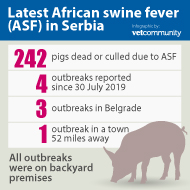ASF: Serbia reports first outbreaks

So far there have been four outbreaks in Serbia since 30 July.
Serbia has reported its first outbreak of African swine fever (ASF), with four outbreaks on backyard premises.
So far there have been four outbreaks since 30 July, resulting in the deaths pf 242 pigs. Three of the outbreaks occurred in the capital Belgrade, and the fourth in a town 52 miles away, Smederevska Palanka.
The source of the outbreak is currently unknown.
ASF has spread widely across Asia, including China and Vietnam, as well as parts of central and Eastern Europe. Cases have also been seen in sub-Saharan Africa.
Slovakia confirmed its first case in July, on a backyard pig holding just a few kilometres from the border with Hungary.
It was reported last week that 130,000 pigs died or were culled in Bulgaria due to ASF outbreaks in July and August. Cases were predominantly seen in the north, north west and central northern parts of the country. Six of the outbreaks occurred on large commercial farms in northern Bulgaria, close to the border with Romania.
In its latest ASF update, the APHA said there has been a distinct rise in the number of cases in domestic pigs in Eastern Europe, predominantly in the backyard sector in Romania.
The risk level for contaminated products entering the UK remains at medium, but APHA is continually reviewing the situation.



 The Federation of Independent Veterinary Practices (FIVP) has announced a third season of its podcast, Practice Matters.
The Federation of Independent Veterinary Practices (FIVP) has announced a third season of its podcast, Practice Matters.